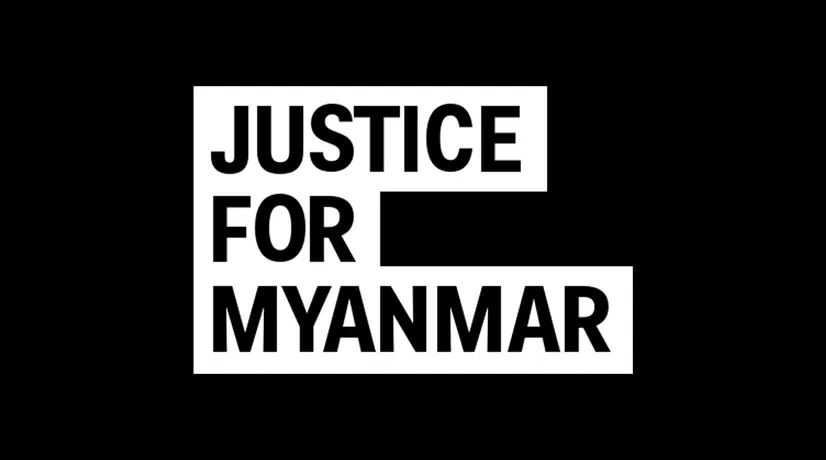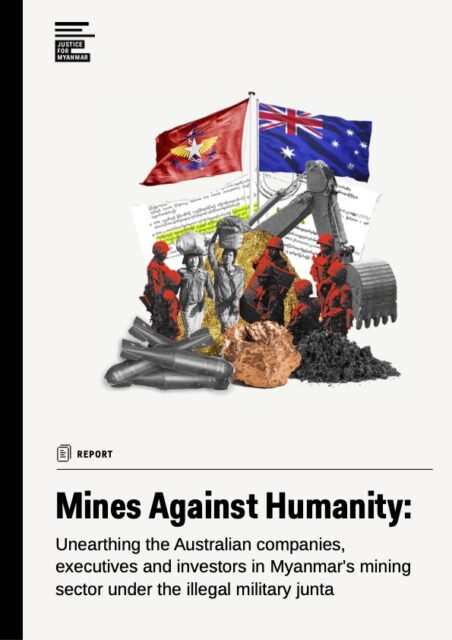Mines Against Humanity
30 January 2024

Mines Against Humanity: Unearthing the Australian companies, executives and investors in Myanmar’s mining sector under the illegal military junta

Executive Summary
Australian executives, investors and companies are omnipresent in Myanmar’s mining sector, and have continued to operate after the brutal military launched an attempted coup on February 1, 2021, providing the junta with support and legitimacy, and helping to ensure the mining sector stays open for business.
The exploitation of natural resources is the biggest source of foreign revenue for the military junta, and mining is a highly lucrative part of that trade. Funds from the mining sector flows to the junta through revenue sharing, rent and tax, helping to fund its ongoing atrocities. The junta has failed to take effective control of Myanmar’s territory because of the sustained and courageous mass resistance of the Myanmar people. It has responded with a war of terror through indiscriminate air strikes and shelling, the killing of more than 4,400 people, rape, torture, the arbitrary arrest of more than 25,800, the destruction of whole communities and the displacement of more than 2.3 million.
Australian owned, led and incorporated companies are conducting mineral exploration, operating mines and providing a wide range of services critical to the continued operation of the mining sector under the military junta. Services include testing, drilling, social and environmental consulting and other technical and regulatory services.
This report documents 10 company networks that have remained active in Myanmar following the coup attempt. It also highlights six company networks that are not currently active in the mining sector but remain registered in Myanmar and require monitoring should they resume operations under the junta. Companies have been included in this report based on their confirmed links to Australia through ownership, place of incorporation and the nationality of company executives. Australian links are detailed for each company network.
The continued Australian presence in Myanmar’s mining sector has been enabled by Australia’s failure to impose sanctions on major portions of the military junta and the mining enterprises it has illegally seized.
Australia’s allies – the US, EU, UK and Canada – have imposed regular rounds of sanctions on the junta and its sources of funds. But it took Australia a full two years after the military’s coup attempt to impose its only round of sanctions on junta members and two military conglomerates, Myanmar Economic Corporation (MEC) and Myanma Economic Holdings Limited (MEHL).
Companies named in this report include:
- Valentis, a sprawling network of companies backed by Australian investors set up by brothers closely connected to the military. Many of the Valentis network companies are active even after the military’s coup attempt, and have a history of working on controversial mine projects. Among Valentis’s activities, Justice For Myanmar’s investigation uncovered an apparent visit to an MEC coal project since the coup attempt, the provision of services to a Myanmar arms broker and business links to a militia under junta control.
- Cornerstone Resources – a company thought to be owned by prominent Australian prospector Mark Creasy, and that has an Australian address, has continued to mine and refine zinc in Shan state following the military’s coup attempt. Justice For Myanmar uncovered transactions with MEC, which may breach UK sanctions given its previous registration in the British Virgin Islands at the time of the transactions.
- The Australian branch of the global consulting firm Knight Piésold is providing social and environmental services to the China-owned Wanbao Mining for copper mines that operate in partnership with MEHL, a conglomerate Australia sanctioned on February 1, 2023. The Wanbao-run Letpadaung mine is known for grave human rights violations. Services were provided as recently as 2023 and it is uncertain whether Knight Piésold is interpreting their contractual obligations consistently with the due diligence exception in the Australian Autonomous Sanctions Act 2011 to avoid breaching the sanctions against MEHL.
- The Australia-based miner PanAust has maintained its large-scale exploration licences in Sagaing, a region ravaged in the junta’s campaign of terror. By paying fees to the junta, it helps fund its atrocities.
- PSI Drilling, a mining services company with an Australian director and shareholder, has continued to operate in Myanmar following the coup attempt, in partnership with Myanmar’s Georesources Group. Since the coup attempt, Georesources has advertised that it has provided services to mines controlled by MEHL, including the Letpadaung copper mine. PSI Drilling is part of the joint venture with Georesources, but it is unclear whether this joint venture is the one involved in the Letpadaung copper mine. Because Letpadaung copper mine is operated under a joint venture with MEHL, any Australian involvement following the sanctions imposition date may constitute a breach of sanctions.
- Asia Pacific Mining Limited, a company with Australian executives, has been communicating with senior members of the junta to continue and expand its exploration activities under cover of the military’s coup attempt.
- Even after the coup attempt and amid local opposition, Australian-led company Access Asia Mining has been pushing ahead with environmentally destructive gold exploration in eastern Shan state.
- Australian Laboratory Services (ALS), listed on the Australian Stock Exchange, has maintained its business in Myanmar following the military’s coup attempt and has done mineral testing for Access Resources Asia and junta-controlled universities.
- Mission Legal, an Australian law firm that provides services to at least three mining companies named in this report has continued to operate following the military’s coup attempt, supporting the mining sector under the junta.
In all but one instance, companies entered Myanmar during the military-controlled period of “disciplined democracy” from 2011 to 2021. This period witnessed reforms to open up the mining sector to foreign investment, and during which there are documented links between the mining industry and the military’s international crimes. Despite this, the Australian government was promoting investment in the sector.
By continuing to operate in the mining sector in Myanmar, Australian companies risk aiding and abetting the junta’s ongoing war crimes and crimes against humanity, undermining sanctions imposed across the Western world, and undermining the spirit of the NUG Ministry of Planning, Finance and Investment Three-Pillar Framework Guiding Responsible Investment and Continued Operations. Justice For Myanmar calls on companies operating in Myanmar to follow the laws, policies and guidance of the legitimate federal bodies, including the National Unity Government (NUG), National Unity Consultative Council (NUCC), applicable state councils, and relevant Ethnic Resistance Organisations (EROs). Australian government and companies should also be upholding the standards set in the OECD Guidelines for Multinational Enterprises on Responsible Business Conduct, the OECD Due Diligence Guidance for Responsible Business Conduct, the OECD Due Diligence Guidance for Responsible Supply Chains of Minerals from Conflict-Affected and High-Risk Areas, and the UN Guiding Principles on Business and Human Rights.
Justice For Myanmar calls on Australia to immediately impose sanctions on mining enterprises controlled by the junta, and to investigate companies conducting mining business with the junta and its corporations to consider imposing sanctions. Justice For Myanmar calls upon the broader international community to collaborate in the imposition and enforcement of targeted sanctions imposed against actors in the Myanmar extractives industry.
Announcements
28 February 2025
Asian NGO Network on National Human Rights Institutions , CSO Working Group on Independent National Human Rights Institution (Burma/Myanmar)
Open letter: Removal of the membership of the dis-accredited Myanmar National Human Rights Commission from the Southeast Asia National Human Rights Institution Forum

Progressive Voice is a participatory rights-based policy research and advocacy organization rooted in civil society, that maintains strong networks and relationships with grassroots organizations and community-based organizations throughout Myanmar. It acts as a bridge to the international community and international policymakers by amplifying voices from the ground, and advocating for a rights-based policy narrative.